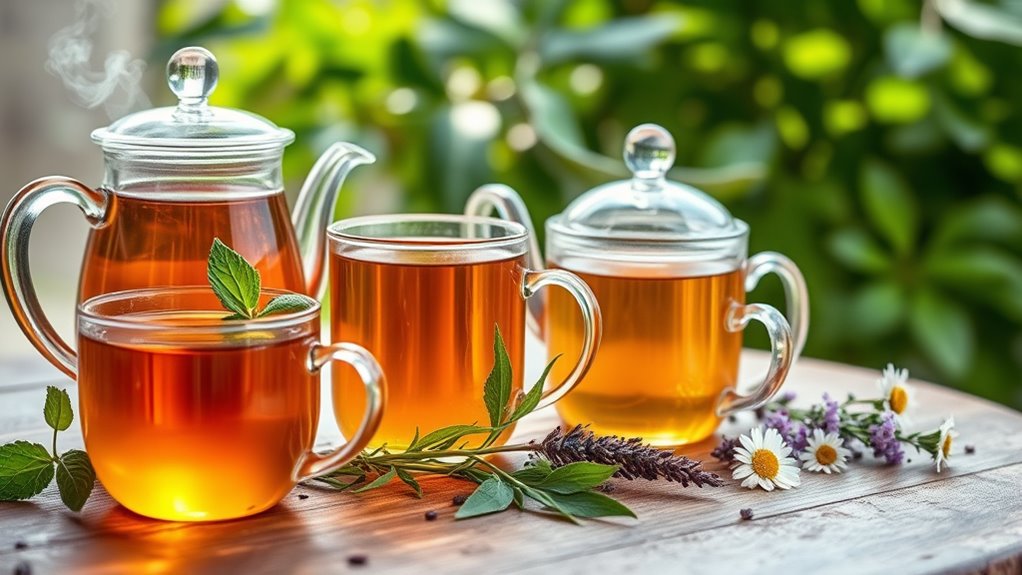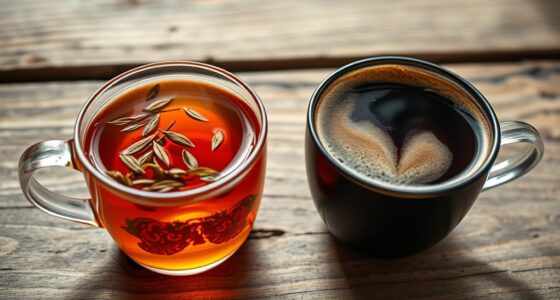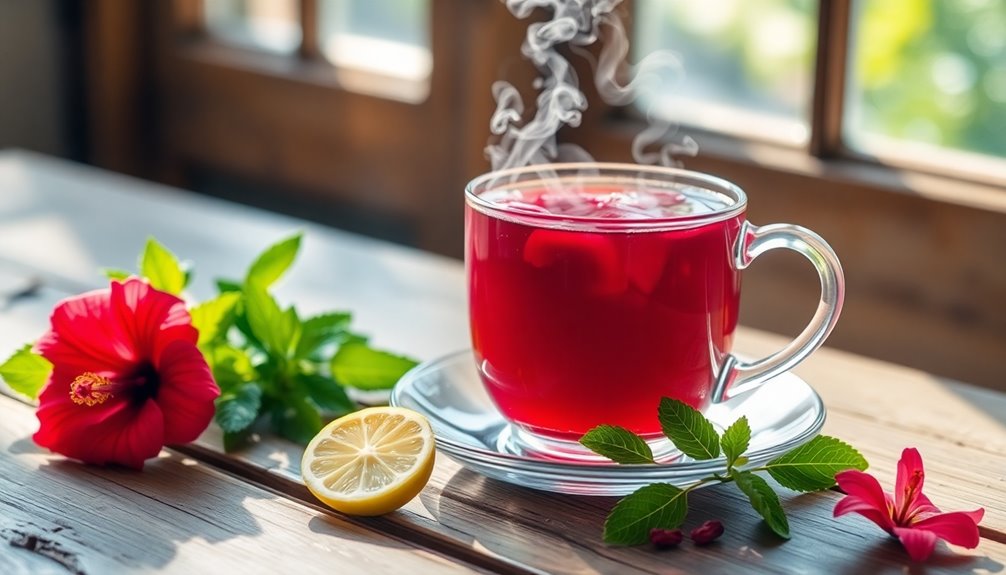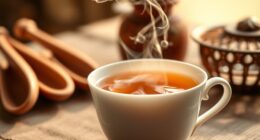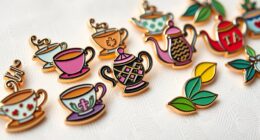If you want to naturally lower your blood pressure, try herbal teas like hibiscus, which relaxes blood vessels and reduces inflammation, or green and white teas, packed with antioxidants that support heart health. Garlic-infused teas can also help thin the blood and improve vessel elasticity. Hawthorn tea boosts circulation and strengthens the heart. Keep exploring to discover how these teas can fit into your daily routine for better cardiovascular wellness.
Key Takeaways
- Hibiscus tea effectively lowers systolic and diastolic blood pressure through vascular relaxation and anti-inflammatory properties.
- Green and white teas, rich in catechins, support heart health and can reduce blood pressure over time with regular consumption.
- Garlic-infused herbal teas promote blood thinning and vessel elasticity, aiding in natural blood pressure regulation.
- Hawthorn tea improves heart function and circulation by strengthening the heart muscle and dilating blood vessels.
- Combining herbs like ginger, rose hips, or essential oils enhances the blood pressure-lowering effects of these herbal teas.
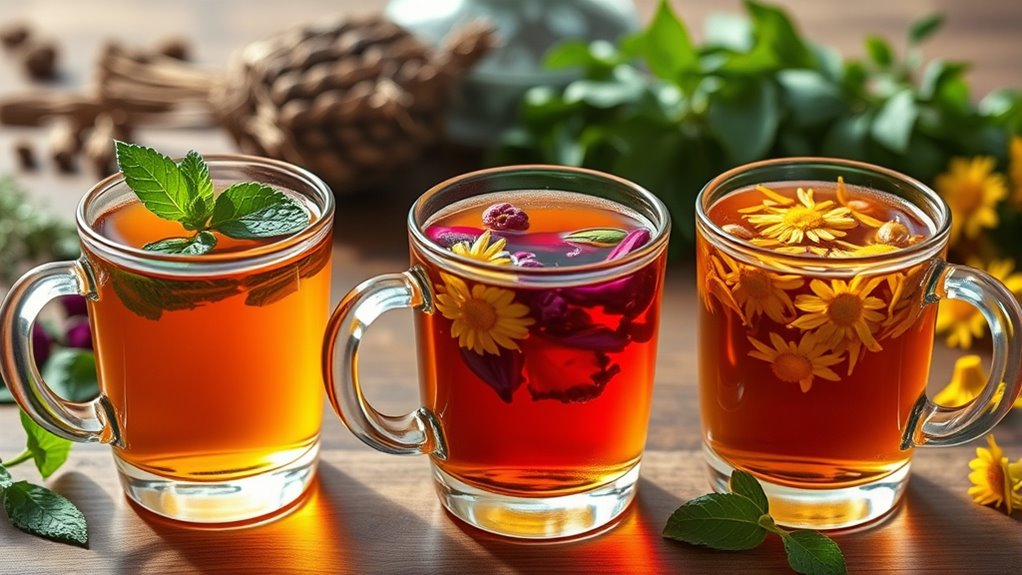
If you’re looking for natural ways to lower your blood pressure, herbal teas can be a helpful addition to your wellness routine. Many herbal blends possess medicinal properties that can support your cardiovascular health, making them a popular choice for those seeking a gentle, natural approach. These teas are often rich in antioxidants and bioactive compounds that may help relax blood vessels, reduce inflammation, and promote better circulation. By incorporating herbal teas into your daily regimen, you can harness these benefits without relying solely on medication.
Herbal teas support cardiovascular health naturally, relaxing blood vessels and reducing inflammation for better circulation.
One of the most well-known herbs for lowering blood pressure is hibiscus. When brewed into a tea, hibiscus offers a vibrant red color and a tart flavor that’s both revitalizing and beneficial. Its medicinal properties include the ability to help reduce systolic and diastolic blood pressure levels. Several studies suggest that drinking hibiscus tea regularly can help relax blood vessels and improve overall vascular function. Its herbal blends often combine hibiscus with other herbs like ginger or rose hips to enhance flavor and boost health benefits.
Another effective herbal option is green or white tea, which contains antioxidants called catechins. These compounds support heart health by improving blood flow and reducing oxidative stress. Drinking green tea daily may contribute to lower blood pressure levels over time, especially when combined with a healthy diet and lifestyle. The medicinal properties of these teas are well-documented, and their subtle flavors make them a pleasant addition to your routine.
Garlic-infused herbal teas are also gaining popularity for their cardiovascular benefits. While fresh garlic is known for its ability to help thin the blood and reduce blood pressure, garlic teas offer a milder, more palatable way to enjoy these medicinal properties. Many herbal blends incorporate garlic with herbs like ginseng or lemon balm to create a soothing, health-boosting beverage. Regular consumption of garlic herbal teas may support healthy blood pressure levels by promoting better blood vessel elasticity and reducing inflammation.
Additionally, the presence of essential oils in herbal teas like hawthorn can further enhance their therapeutic effects on blood pressure and heart health. Hawthorn tea is often recommended for its ability to improve heart function and circulation. Its medicinal properties include strengthening the heart muscle and dilating blood vessels, which can help lower blood pressure. The herbal blends used in hawthorn teas typically combine the leaves, berries, or flowers of the plant, creating a flavorful and therapeutic drink. Regularly sipping hawthorn tea could be a simple yet effective way to support your cardiovascular health naturally.
Incorporating these herbal teas into your routine offers a natural, enjoyable way to support healthy blood pressure levels. Just remember to consult your healthcare provider before making significant changes, especially if you’re on medication or have existing health conditions.
Frequently Asked Questions
Are Herbal Teas Safe for Long-Term Blood Pressure Management?
You might wonder if herbal tea safety is reliable for long-term blood pressure management. Generally, herbal teas are safe when consumed in moderation, but long-term herbal effects can vary depending on the herbs used. It’s crucial to consult your healthcare provider to make certain these teas won’t interfere with medications or health conditions. Monitoring your response over time helps you enjoy their benefits safely and effectively.
Can Herbal Teas Replace Prescribed Blood Pressure Medications?
You shouldn’t rely solely on herbal tea efficacy to replace prescribed blood pressure medications. While herbal teas like hibiscus and green tea can support your health, they have natural remedy limitations and aren’t a substitute for medical treatment. Always consult your doctor before making changes. Herbal teas can complement your treatment plan but aren’t designed to manage blood pressure effectively on their own.
Which Herbal Teas Are Best for Rapid Blood Pressure Reduction?
Imagine a gentle river calming turbulent waters—that’s what herbal tea varieties can do for your blood pressure. For rapid blood pressure reduction, try hibiscus and valerian root teas. Hibiscus, like a soothing wave, helps lower pressure quickly, while valerian acts as a calming breeze. Incorporate these blood pressure reduction techniques into your routine, but remember they complement, not replace, medical advice.
Are There Any Side Effects From Drinking Herbal Teas Regularly?
Drinking herbal teas regularly can be enjoyable, but you should be aware of herbal tea interactions and potential allergies. Some herbs may cause allergic reactions or interact with medications, affecting their efficacy. For example, certain teas might lower blood pressure too much or interfere with blood thinners. Always check ingredients and consult your healthcare provider if you have allergies or take medications, to guarantee safe consumption and avoid adverse effects.
How Much Herbal Tea Should I Consume Daily to Lower Blood Pressure?
When it comes to tea intake for lowering blood pressure, it’s important to follow dosage guidelines. You should aim for 2 to 3 cups of herbal tea daily, which is generally safe and effective. However, listen to your body and avoid excessive consumption, as too much tea can cause side effects. Always consult your healthcare provider for personalized advice, especially if you’re on medication or have health concerns.
Conclusion
By incorporating these herbal teas into your daily routine, you can help keep your blood pressure in check naturally. Think of them as gentle waves calming a restless sea—each sip working steadily to restore balance. Remember, consistency is key, and always consult your healthcare provider before making significant changes. Embrace these teas as part of a holistic approach to health, and you’ll find your blood pressure gradually finding its peaceful, steady rhythm.

